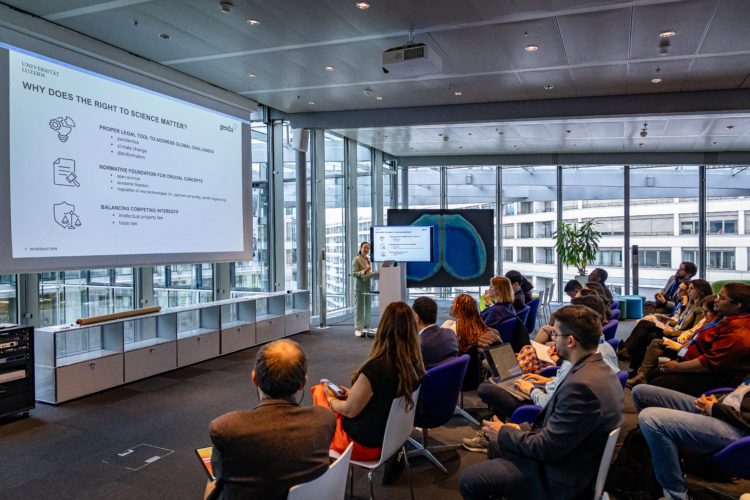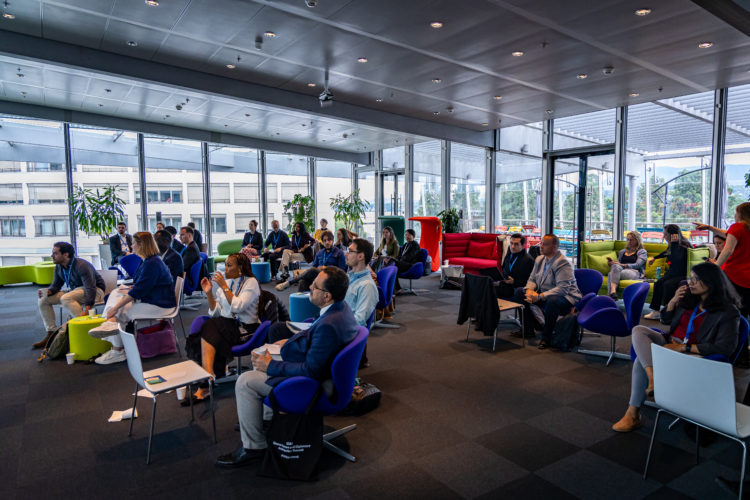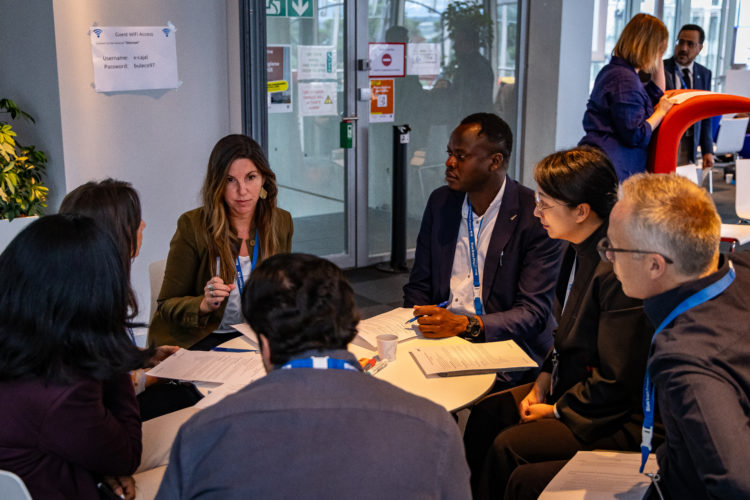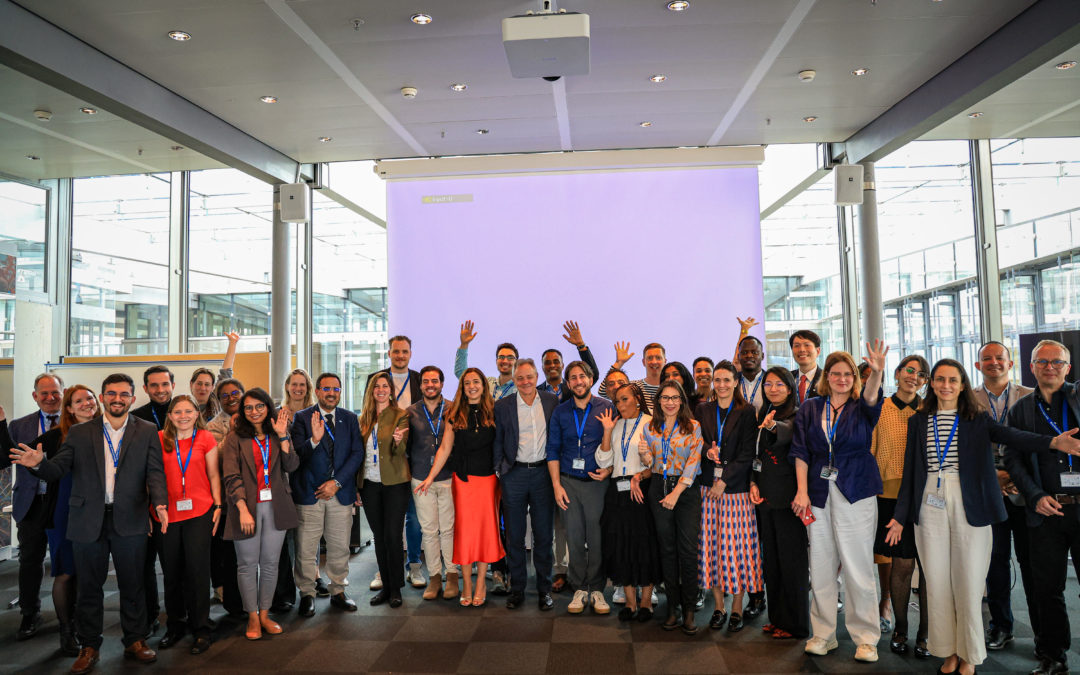The final day of Geneva Science Diplomacy Week 2024 began with an introduction to the human right to science, a little-used tool for addressing global challenges, and continued with a lesson in ‘kizuki’ on global cooperation.
GESDA’s cohort of 30 participants huddled in the Swiss foundation’s headquarters at Campus Biotech to hear about the human right to science – established under Article 27 of the Universal Declaration of Human Rights (UDHR) and Article 15 of the International Covenant on Economic, Social and Cultural Rights (ICESCR) – from Gérard Escher, a GESDA senior advisor, and Monika Plozza, a senior research associate and lecturer at the University of Lucerne who serves as an advisor to GESDA on the issue.
Plozza called it “the sleeping beauty of human rights law.” The UDHR, while not legally binding, says everyone has a right to share in scientific advances and benefits. The ICESCR, which does create treaty obligations, says everyone has a right to enjoy the benefits of scientific progress and its applications.
“Many scholars, practitioners, and other human rights experts are not aware that there is such a thing as a human right to science,” she said. “It is important because it is the proper legal tool, first of all, to address global challenges that we are facing today such as pandemics, climate change, and disinformation.”
Among those obliged to follow the law are nations, universities and research institutions, along with international organizations, publishers, and companies. Science, she said, is defined as “any serious, methodical effort to uncover the truth in both content and form, providing the most reliable statements currently possible on topics recognized by different knowledge systems.”
After the presentation, a simulation card game teased out inherent tensions and competing interests among individual, group, national and global interests that could add to or hinder the UN’s 17 Sustainable Development Goals for 2030. The game tied together everything participants learned during the week.
Participants broke into small groups to make tradeoffs with world-changing consequences for the economy, environment and society. After the first round, participants could see all of the results on a fictional ‘World Condition Meter.’

All photos by Michael Chiribau, UNITAR Division for Multilateral Diplomacy
‘The ability of science to deliver benefits’
By the end of the exercise, the cohort managed to ensure that the economy was prospering, the environment was healing, and society was flourishing, though some populations were left behind. One small group of negotiators was mortified to discover they had unwittingly used child labor in one project, offering a lesson on the dangers of focusing too much on the tradeoffs from the dealmaking and not enough on trying to understand the bigger picture.
Others said they realized that with persistence it is possible to steadily reach a global alliance, and that the training sessions show the value of science coupled with creativity. “In Japanese it’s called a kizuki, and a kizuki is this aha moment, the realization, the discovery that you have. And each one of you would have had different kizukis,” said the game’s facilitator, Alice Richard, a professional trainer and coach with Co-CREATE ImpACT.
Preparing leaders for a world accelerated by science and technology involves foundational knowledge, science anticipation, a capacity to act and enriched perspectives, says Marga Gual Soler, GESDA’s head of science diplomacy capacity building, who oversees the week’s curriculum and activities.
“Many of these interactions depended on connection and the level of us communicating. And I think this is something we achieved during the week, such an amazing group,” said Christian Lara, a senior policy advisor who works with the U.N. Resident Coordinator system focusing on strategic planning and development coordination in emergencies. “It’s something to take with us in the end, diplomacy and science. We have to engage more, I think.”
Jonathan Underwood, who leads Wellcome Trust’s major international programs, said he was struck by how much the legal basis for the human right to science is tied to creativity. “In every sentence, when you look at the articles, I think you see without exception that science is coupled with creativity, that both those things are seen as assets which must be protected,” he said.
Jeremy Farrar, the World Health Organization’s chief scientist and a former GESDA board member, said in a closing keynote talk that trust is not built during a crisis – it must be built up beforehand. He emphasized the importance of listening and described the international organizations established in the wake of World War II as not fit for governance today. While we live in a golden age of science, he said, politics is too concerned with near-term results, and people going into politics aren’t scientifically literate or enthusiastic about science, diminishing our ability to see what’s coming.
“And when you can’t see what’s coming, you often react out of fear. And I think that’s hugely damaging to the ability of science to deliver benefits,” he said. “So GESDA is an attempt to try to bring those together. And your community is attempting to bring that together. And I think that is absolutely critically important if we’re going to ensure that science, innovation and technology in the next 50 years does not increase inequality, which will ultimately lead to conflict with one another – and we can use science to the maximum benefit for the maximum number of people. So that’s our challenge.”

All photos by Michael Chiribau, UNITAR Division for Multilateral Diplomacy

The challenge of shifting perspectives
The cohort’s participants had spent the week role playing as scientists, diplomats and policymakers, and discovered for themselves how hard it can be to shift perspectives, Gual Soler noted. “This is a learning experience more than any academic expertise,” she said.
As a surprise, five participants from earlier cohorts shared their experiences. The five are Sabina Stadler, chief strategist for Slovenia’s Ministry of Foreign Affairs; Francisco Ashley Acedillo, assistant director general for cyber and emerging threats in the Philippines’ presidential office; Ron Stoop, professor and psychiatrist at University of Lausanne; Philippe Caroff, executive director of the Swiss Federal Institute of Technology Lausanne (EPFL) Center for Quantum Science and Engineering; and Sahar Albahar, parliamentarian and deputy chair of the foreign relations committee in Egypt’s House of Representatives.
“It’s interesting how when you go back full of new ideas and very excited about meeting so many people and learning so much in just one week, how to apply this kind of knowledge, how to apply certain things that sound extremely strange for your own profession,” said Stadler. “I try to dive a little bit deeper on how to mend the gap between foresight and anticipation, and policy making and decision making. I’ll try to fill it – hopefully!”
Caroff, who was an academic researcher for 15 years including a stint as principal research manager at Microsoft Quantum, said the world probably has about 10 years to prepare for quantum computers, and in that time scientists have to learn how to be able to talk with diplomats and policymakers.
“How do we talk with people with such a huge culture gap?” he asked. “And so for me, the opportunity of the Science Diplomacy Week was taking one step towards the policymakers and the diplomats in their language, in the way they operate, in order to be able to convey and have a dialogue on a better basis. Because not just policymakers and diplomats have to take a step toward the science; also scientists have to take a step toward being able to communicate.”
For this year’s cohort, perhaps no one had a more dramatic turnaround than Sneha Sinha, a consultant at a New Delhi-based Research and Information System for Developing Countries, which is supported by India’s Ministry of External Affairs. She described enduring a near-death experience and medical procedure, accompanied by constant pain, that initially left her persuaded she would have to postpone taking part in Geneva Science Diplomacy Week.
“But then I think God did something,” she said. “It has been a reawakening. It’s a new life and a very good way of how I’ve built amazing personal bonds and relationships with all of you, which I think I should cherish forever.”
Story by John Heilprin
